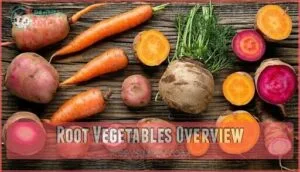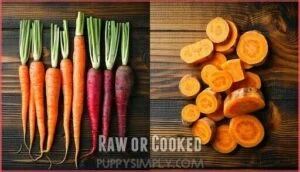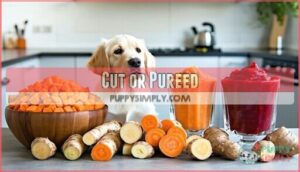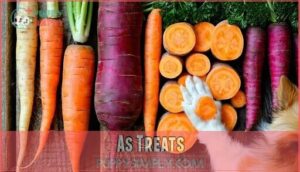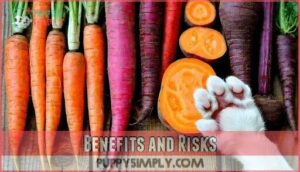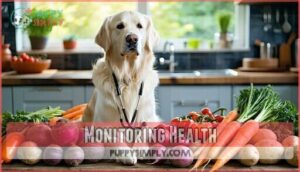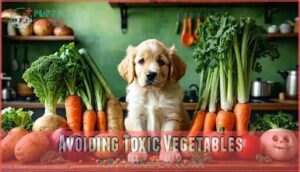This site is supported by our readers. We may earn a commission, at no cost to you, if you purchase through links.
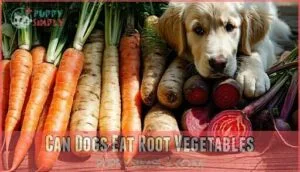 Yes, dogs can eat root vegetables, but some are better than others.
Yes, dogs can eat root vegetables, but some are better than others.
Carrots, sweet potatoes, parsnips, and beets are safe options, offering vitamins, fiber, and antioxidants.
They’re great in small amounts, either raw (thinly sliced) or cooked without seasoning, and can be thought of as the vegetable version of doggie snacks—crunchy, sweet, and nutritious.
Just avoid onions, garlic, or anything spicy, which can harm your pup, and don’t overdo it; too much can upset their stomach.
Start small, see how your dog reacts, and always check with your vet.
Curious about prepping these veggies the right way? There’s more to learn ahead!
Table Of Contents
- Key Takeaways
- Root Vegetables Overview
- Can Dogs Eat Root Vegetables
- Safe Root Vegetables
- Benefits and Risks
- Adding Root Vegetables Safely
- Frequently Asked Questions (FAQs)
- Are any root vegetables toxic to dogs?
- What kind of vegetables dogs Cannot eat?
- Can dogs eat carrots and parsnip?
- Can dogs eat cooked cabbage and potatoes?
- How much root vegetables should I feed my dog?
- Are root vegetables better for my dog than other vegetables?
- Can I give my dog root vegetables if it has a sensitive stomach?
- Are canned or frozen root vegetables safe for dogs?
- What is the best way to prepare root vegetables for my dog?
- How do dogs digest root vegetables effectively?
- Conclusion
Key Takeaways
- Stick to safe root veggies like carrots, sweet potatoes, beets, and parsnips, but avoid toxic ones like onions and garlic.
- Always cook or chop root vegetables to improve digestion and prevent choking.
- Feed them in moderation—too much can upset your dog’s stomach or cause health issues.
- Monitor your dog’s reaction when introducing new veggies and consult your vet if you notice any problems.
Root Vegetables Overview
Root vegetables are packed with nutrients and can be a healthy addition to your dog’s diet when prepared properly.
Packed with nutrients, root vegetables offer a tasty, healthy boost to your dog’s diet—when prepared with care and love!
Understanding which ones are safe helps you make better choices for your furry friend.
Carrots
Carrots are a fantastic choice among root vegetables for dogs. They’re easy to digest and packed with beta-carotene, which supports vision and skin health. Plus, they double as natural dental sticks!
Carrots are a nutrient-rich treat for dogs, promoting better vision, healthier skin, and even doubling as natural dental care!
- Dental benefits: Chewing carrots helps clean teeth.
- Vision support: Rich in vitamin A for eye health.
- Carrot preparation: Serve raw, cooked, or pureed for easier digestion.
Beets
Beets are another safe option among root vegetables dogs enjoy.
Packed with fiber, vitamins, and minerals, they can boost your pup’s digestion and overall health.
To avoid Beet Risks, feed small, cooked portions, as raw beets can be a choking hazard.
For ideal Beet Preparation, steam or bake them, ensuring no seasoning.
Always monitor Beet Dosage, starting slow for sensitive pups.
Sweet Potatoes
Sweet potatoes are a fantastic addition to your dog’s diet.
Packed with nutrient density, they’re rich in fiber, vitamins A and C, and antioxidants.
Their low glycemic index helps maintain steady energy levels.
Preparation methods matter—serve them cooked, mashed, or baked, avoiding raw pieces.
Stick to small serving sizes to prevent overloading your pup.
Recipe ideas? Try mixing them into meals with small serving sizes and consider preparation methods.
Parsnips
If sweet potatoes are the comfort food of root vegetables, parsnips are their underrated cousin. These dog-safe veggies pack a punch with vitamins C, B6, and folate.
To include parsnips in your dog’s diet:
- Cook or steam them for easy digestion.
- Serve in small pieces or pureed.
- Avoid adding spices or butter.
Healthy and simple! You can also consider rutabaga, which offers immune system support for your canine companion.
Can Dogs Eat Root Vegetables
Root vegetables can be a healthy addition to your dog’s diet, but not all are safe.
Dogs eat carrots, sweet potatoes, parsnips, and beets without issues, as long as you prepare them properly. Root vegetable prep is key—raw options can be tough on digestion, so steaming or pureeing works best.
Serving size matters, too; moderation prevents sugar spikes or tummy trouble. Breed-specific needs play a role, as smaller dogs may require smaller portions.
Holistic dog nutrition emphasizes variety, so vegetables for dogs should complement their overall diet, not replace it. Remember to check safe fruits for dogs as another way to diversify your dog’s diet.
If your pup isn’t a fan, vegetable alternatives like squash or pumpkin might be worth trying. Always research safe root vegetables before feeding, and avoid toxic ones like onions or garlic.
Safe Root Vegetables
You can safely share several root vegetables with your dog, like carrots, sweet potatoes, and parsnips.
Just make sure they’re prepared properly to avoid any choking hazards or digestive issues.
Raw or Cooked
When deciding between raw or cooked vegetables for dogs, consider these factors:
- Cooking Methods: Steaming or boiling retains nutrients while softening texture.
- Nutrient Retention: Cooking can enhance digestibility but may reduce some vitamins.
- Digestibility Concerns: Cooked vegetables are gentler on sensitive stomachs.
- Palatability Factors: Dogs often prefer the taste of cooked root vegetables.
Always prioritize preparation safety!
Cut or Pureed
Chopping or pureeing root vegetables helps with digestibility concerns and nutrient absorption, making them easier for your dog to enjoy.
Preparation methods like blending or steaming improve palatability factors. Stick to small serving sizes, as cooked vegetables for dogs should complement their diet, not replace it.
You can find various options for dog food to suit your dog’s needs. Vegetables good for dogs, like carrots or parsnips, offer root vegetables benefits when safely prepared, considering digestibility concerns and the importance of nutrient absorption.
As Treats
Using root vegetables as dog treats is a smart move, blending nutrition with fun.
Treat portioning is key—keep servings small to avoid overfeeding. Carrots and sweet potatoes make excellent training rewards and offer dental benefits.
For healthy alternatives, try beets or parsnips. Treat preparation matters; cook or puree to enhance digestibility while boosting dog nutrition vegetables for a tasty, safe snack.
Many owners also feed their dogs rutabagas, which boost the immune system, providing an additional nutrition benefit with a tasty reward.
Benefits and Risks
Feeding your dog root vegetables can offer plenty of nutritional benefits.
But there are some risks to watch out for, and it’s important to know which veggies are safe and how to prepare them properly.
To keep your pup healthy and happy.
Nutritional Benefits
Packed with vitamins and minerals, root vegetables like carrots, beets, and sweet potatoes boost your dog’s overall health.
Their antioxidant power helps fight disease, while fiber benefits support digestive health.
Here’s a quick root vegetables list with their key nutrients:
| Vegetable | Key Nutrients |
|---|---|
| Carrots | Vitamin A, Fiber |
| Beets | Vitamin C, Antioxidants |
| Sweet Potatoes | Vitamin B6, Iron |
| Parsnips | Potassium, Folate |
| Turnips | Vitamin C, Fiber |
Healthy vegetables for dogs are a tasty way to enhance their diet with overall health benefits.
Health Risks
Root vegetables can pose risks for dogs if not prepared properly.
Solanine toxicity from nightshades like green potatoes is harmful.
High sugar content in carrots or sweet potatoes may cause weight gain, yeast flare-ups, or thyroid issues.
Beets and parsnips can lead to kidney stones.
Sorbitol is often found in treats, so be aware of potential risks.
Avoid toxic vegetables dogs can’t digest, like alliums, and monitor portion sizes carefully to prevent health problems.
Allergies and Intolerances
Dogs can develop food allergies at any age, often influenced by breed predisposition. Symptoms like itching or upset stomachs may signal dog food allergies.
Identifying allergens through food trials helps manage these issues. Always prioritize gut health and immune response by sticking to safe vegetables, avoiding toxic vegetables like onions or garlic.
- Common signs: itching, swelling, diarrhea
- Consult your vet
- Use elimination diets
- Monitor for reactions
- Avoid risky foods
Adding Root Vegetables Safely
When adding root vegetables to your dog’s diet, it’s important to introduce them gradually and in small amounts.
Always stick to safe options, and avoid anything toxic like onions or garlic.
Monitoring Health
Keep an eye on your dog’s digestive changes, stool consistency, energy levels, and skin reactions when adding root vegetables to their diet.
Behavioral shifts can signal issues with digestion or allergies. Introduce new dog vegetables slowly, and if something seems off, consult your veterinarian.
Addressing digestive issues might involve a daily probiotic addition. Monitoring guarantees dog health while making vegetables a safe, tasty part of their meals, ensuring a good digestive system and overall wellbeing.
Avoiding Toxic Vegetables
When feeding root vegetables to your dog, avoid toxic options to keep them safe.
Some harmful choices include:
- Onions and garlic: Linked to Allium Risks, causing Onion Toxicity.
- Green potatoes: Dangerous due to Solanine Poisoning.
- Wild mushrooms: Mushroom Dangers abound.
- Grapes and raisins: Grape Toxicity risks kidney failure.
- Nightshade vegetables: Toxic vegetables dogs shouldn’t eat.
Stick with dog-safe foods!
Frequently Asked Questions (FAQs)
Are any root vegetables toxic to dogs?
Some root vegetables, like onions, garlic, and leeks, are toxic to dogs and can cause serious health problems.
Stick to safe options like carrots, sweet potatoes, and beets to keep your furry friend healthy.
What kind of vegetables dogs Cannot eat?
Picture a dog’s dinner as a treasure chest—some gems are poisonous.
Avoid onions, garlic, leeks, chives, and unripe tomatoes. Grapes, raisins, and avocado are also toxic.
A safe plate matters for your pup’s health.
Can dogs eat carrots and parsnip?
Yes, dogs can eat carrots and parsnips.
Both are safe and nutritious, providing vitamins and fiber.
Carrots even help with dental health.
Just slice them into small pieces to avoid choking, especially for smaller dogs.
Can dogs eat cooked cabbage and potatoes?
Imagine your dog enthusiastically waiting—yes, cooked cabbage and potatoes are safe.
Just make certain potatoes are plain, fully cooked (no green spots), and avoid butter or salt.
Cabbage, given in moderation, supports digestion and healthy skin.
How much root vegetables should I feed my dog?
Feed your dog root vegetables like carrots or parsnips in moderation—about 10% of their daily diet.
Too much could upset their stomach.
Chop or cook them for easy digestion, and watch for any reactions.
Are root vegetables better for my dog than other vegetables?
Root vegetables can provide great nutrition for dogs, but "better" depends on your dog’s needs.
They’re packed with fiber and vitamins, yet balance is key.
Mix root veggies with leafy greens for a wholesome diet.
Can I give my dog root vegetables if it has a sensitive stomach?
Dogs with sensitive stomachs can handle certain root vegetables if you introduce them slowly.
Stick to easy-to-digest options like cooked carrots, parsnips, or sweet potatoes.
Avoid raw forms and watch for any upset.
Are canned or frozen root vegetables safe for dogs?
A store-bought shortcut, canned or frozen root vegetables can be safe if plain and unsalted.
Steer clear of added seasonings, syrups, or oils, and make certain they’re thoroughly cooked to avoid upsetting your dog’s tummy.
What is the best way to prepare root vegetables for my dog?
Chop vegetables into bite-sized pieces, cook them by steaming or boiling to soften and retain nutrients, and skip seasoning.
Cool them before serving, and don’t overdo it—moderation keeps your pup healthy and happy!
How do dogs digest root vegetables effectively?
To help your pup digest root vegetables, cook them until soft and cut them into small pieces.
This makes nutrients easier to absorb and prevents choking.
Avoid raw veggies, as they can be tough on digestion!
Conclusion
Root vegetables can be a safe, simple, and satisfying snack for your dog.
From crunchy carrots to sweet potatoes, these foods offer fiber, vitamins, and antioxidants.
Just remember: moderation matters, and some veggies, like onions and garlic, are dangerous.
Always test with small amounts, and keep raw and cooked options plain.
Before adding root vegetables to your dog’s diet, check with your vet.
With smart choices, you’ll keep your pup healthy, happy, and tail-waggingly excited!
- https://nativepet.com/blogs/health/can-dogs-eat-beets?srsltid=AfmBOormh3e5Y4DFui7jIKrU8jX2wjzsuny66u2wb15W9x4KAb2IzvM4
- https://chompandchew.co.uk/dog-nutrition-diet/vegetables-for-dogs/
- https://www.dogsnaturallymagazine.com/what-vegetables-can-dogs-eat/
- https://www.rffdmsuk.co.uk/post/species-appropriate-diet-root-vegetables
- https://www.quora.com/Is-it-safe-for-dogs-to-eat-boiled-cabbage-carrots-and-other-vegetables-What-vegetables-or-fruits-should-I-avoid-feeding-my-dogs

